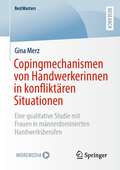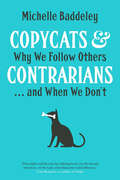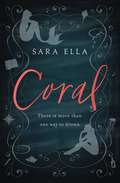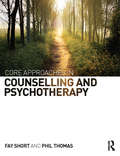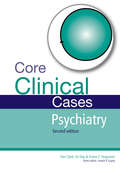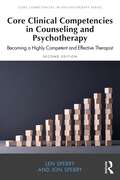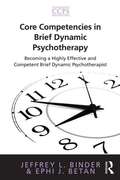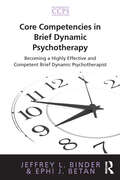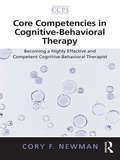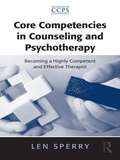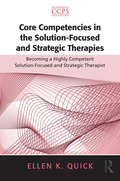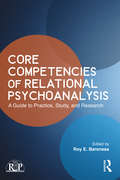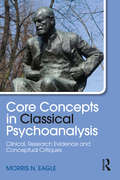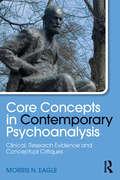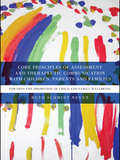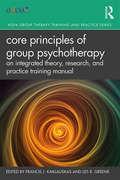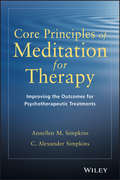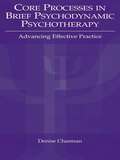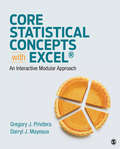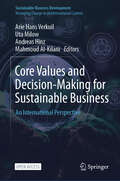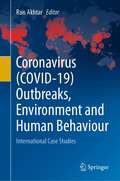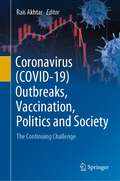- Table View
- List View
Copingmechanismen von Handwerkerinnen in konfliktären Situationen: Eine qualitative Studie mit Frauen in männerdominierten Handwerksberufen (BestMasters)
by Gina MerzImmer mehr Frauen entscheiden sich für die Ausübung eines männerdominierten Handwerksberufs. Quantitative Forschungen zeigen, dass die Handwerkerinnen in ihrem Umfeld Vorurteilen ausgesetzt sind. Dies kann zu konfliktären Situationen führen, die die Frauen als Störfaktor wahrnehmen. Bisherige Forschungen lassen die Sichtweise der Handwerkerinnen auf die Konflikte ihres Berufsalltags vermissen. Daher wird in diesem Buch eine qualitative Forschung mit zehn Frauen in männerdominierten Handwerksberufen durchgeführt. Ziel der Arbeit ist, herauszufinden, welche Copingmechanismen die Handwerkerinnen in konfliktären Situationen anwenden und welche Rolle die Arbeitsmotivation darin einnimmt. Abschließend ermöglicht diese Forschung die Erstellung eines temporal-prozessualen Modells, das den Copingprozess systematisch darstellt und die Einflussfaktoren auf den Prozess berücksichtigt.
Copious hosting: a theology of access for people with disabilities
by Jennie Weiss BlockDiscusses working with people with developmental disabilities in the Roman Catholic church
Copycats & Contrarians: Why We Follow Others . . . and When We Don't
by Michelle Baddeley&“Why we run with—or avoid—the crowd, and why it matters, from choosing a restaurant in a tourist trap to believing fake news. I learned a lot&” (Tim Harford, author of The Undercover Economist). Rioting teenagers, tumbling stock markets, and the spread of religious terrorism appear to have little in common, but all are driven by the same basic instincts: the tendency to herd, follow, and imitate others. In today&’s interconnected world, group choices all too often seem maladaptive. With unprecedented speed, information—or misinformation—flashes across the globe and drives rapid shifts in group opinion. Adverse results can include speculative economic bubbles, irrational denigration of scientists and other experts, seismic political reversals, and more. Drawing on insights from across the social, behavioral, and natural sciences, Michelle Baddeley explores contexts in which behavior is driven by the herd. She analyzes the rational vs. nonrational and cognitive vs. emotional forces involved, and she investigates why herding only sometimes works out well. With new perspectives on followers, leaders, and the pros and cons of herd behavior, Baddeley shines vivid light on human behavior in the context of our ever-more-connected world. &“Her observations on how both risk-taking and conformism contributed to Donald Trump&’s election, and on how social media affects &‘copycats,&’ make for a well-timed and valuable study.&” —Publishers Weekly &“This might well become the defining book, for this decade and more, on the topic of herding and social influence.&” —Cass Sunstein, co-author of Nudge
Coral
by Sara EllaInspired by &“The Little Mermaid,&” Coral explores what it means to be human in a world where humanity often seems lost.Coral has always been different, standing out from her mermaid sisters in a society where blending in is key. She fears she has been afflicted with the dreaded Disease said to be carried by humans: emotions. Her sister had the Disease, and Red Tide took her away. Will it come for Coral next?Above the sea, Brooke has nothing left to give. Depression and anxiety have left her feeling isolated. Forgotten. The only thing she can rely on is the numbness she finds within the cool and comforting ocean waves. If only she weren&’t stuck at a new group-therapy home that promises a second chance at life. But what&’s the point of living if her soul is destined to bleed?Merrick may be San Francisco&’s golden boy, but he wants nothing more than to escape his controlling father. When his younger sister&’s suicide attempt sends Merrick to his breaking point, escape becomes the only option. If he can find their mom, everything will be made right again—right?When their worlds collide, all three will do whatever it takes to survive. But what—and who—must they leave behind for life to finally begin?Praise for Coral:&“This heart-wrenching tale will pull you under its spell.&” —ANNIE SULLIVAN, author of A Touch of Gold and Tiger Queen&“A beautiful reimagining.&” —LAUREN MANSY, author of The Memory Thief&“A breathless, powerful journey of the heart and mind.&” —LINDSAY A. FRANKLIN, award-winning author of The Story PeddlerA stand-alone, full-length Young Adult novelTrigger warning: suicide and depression
Core Approaches in Counselling and Psychotherapy
by Phil Thomas Fay ShortCore Approaches in Counselling and Psychotherapy is a comprehensive guide to the four main psychological approaches (Humanistic, Psychodynamic, Behavioural and Cognitive) and introduces several of the most common therapies used today. This textbook contains sufficient coverage to explain all of the most important elements of these core approaches and sufficient depth to provide a detailed analysis of the ten main therapies: Person-Centred Therapy, Psychoanalytic Therapy, Behaviour Therapy, Cognitive Therapy, Gestalt Therapy, Transactional Analysis, Rational Emotive Behaviour Therapy, Cognitive-Behaviour Therapy, Multimodal Therapy and Neurolinguistic Programming. The book focuses on the development of each approach and presents the associated therapy in its historical and psychological context, giving a deeper insight into the theories and clarifying the overlap between different therapies. Presented in a unique style, with a clear layout, rigorous content and extensive resources available online, Core Approaches in Counselling and Psychotherapy is an invaluable asset for undergraduate and postgraduate students at all levels of study and is the ideal textbook for any degree or higher-level module in counselling.
Core Clinical Cases in Psychiatry: A problem-solving approach (Core Clinical Cases)
by Tom Clark Ed Day Emma FergussonYou've read your textbook and your course notes. Now you need to apply your knowledge to real life clinical situations.The problem-solving approach of Core Clinical Cases guides you to think of the patient as a whole, rather than as a sequence of unconnected symptoms. With its emphasis on everyday practice strongly linked to underlying theory, the
Core Clinical Competencies in Counseling and Psychotherapy: Becoming a Highly Competent and Effective Therapist (Core Competencies in Psychotherapy Series)
by Len Sperry Jon SperryCore Clinical Competencies in Counseling and Psychotherapy addresses the core competencies common to the effective practice of all psychotherapeutic approaches and includes specific intervention competencies of the three major orientations. This second edition emphasizes six core competencies common to the effective practice of all psychotherapeutic approaches. It includes the most commonly used intervention competencies of the cognitive-behavioral approaches—including Mindfulness-Based Cognitive Therapy, Dialectical Behavioral Therapy, and Acceptance and Commitment Therapy—psychodynamic approaches, and systemic approaches. This highly readable and easily accessible book enhances the knowledge and skill base of clinicians—both novice and experienced. The second edition has been fully revised throughout and includes a new appendix featuring handouts and worksheets. This book is essential to practicing clinicians and trainees in all mental health specialties, such as counseling, counseling psychology, clinical psychology, family therapy, social work, and psychiatry.
Core Competencies in Brief Dynamic Psychotherapy: Becoming A Highly Effective And Competent Brief Dynamic Psychotherapist (Core Competencies In Psychotherapy Ser.)
by Jeffrey L. Binder Ephi J. BetanThis book addresses the essential clinical competencies required to conduct brief dynamic therapy. Authors Jeffrey L. Binder and Ephi J. Betan discuss the conceptual foundation of their treatment model, and the application of this framework in forming and maintaining a therapeutic alliance, assessment, case formulation, implementing a treatment plan, termination, and treatment evaluation. All topics include a multicultural perspective and sensitivity to ethical issues. Binder and Betan attempt to bridge practice and research by consistently incorporating relevant research findings. Graduate students in the mental health fields and beginning therapists will find in this text the basic concepts and principles of brief dynamic psychotherapy presented in a clear and straightforward style, with many clinical examples drawn from detailed patient and therapist interchanges. Seasoned psychotherapists will find in Binder and Betan’s discussions of case formulation and therapeutic discourse a fresh treatment of classic ideas about the therapeutic value of constructing personal narratives. At all times, the authors explicitly tie the components of their approach to the competencies required of the brief dynamic therapist. In the current environment of accountability for results, attention is given to the ongoing assessment of therapeutic progress and ultimate outcomes. This text is a scholarly yet practical guide to the evidence-based practice of brief dynamic psychotherapy.
Core Competencies in Brief Dynamic Psychotherapy: Becoming a Highly Effective and Competent Brief Dynamic Psychotherapist (Core Competencies in Psychotherapy Series)
by Jeffrey L. Binder Ephi J. BetanThis book addresses the essential clinical competencies required to conduct brief dynamic therapy. Authors Jeffrey L. Binder and Ephi J. Betan discuss the conceptual foundation of their treatment model, and the application of this framework in forming and maintaining a therapeutic alliance, assessment, case formulation, implementing a treatment plan, termination, and treatment evaluation. All topics include a multicultural perspective and sensitivity to ethical issues. Binder and Betan attempt to bridge practice and research by consistently incorporating relevant research findings. Graduate students in the mental health fields and beginning therapists will find in this text the basic concepts and principles of brief dynamic psychotherapy presented in a clear and straightforward style, with many clinical examples drawn from detailed patient and therapist interchanges. Seasoned psychotherapists will find in Binder and Betan’s discussions of case formulation and therapeutic discourse a fresh treatment of classic ideas about the therapeutic value of constructing personal narratives. At all times, the authors explicitly tie the components of their approach to the competencies required of the brief dynamic therapist. In the current environment of accountability for results, attention is given to the ongoing assessment of therapeutic progress and ultimate outcomes. This text is a scholarly yet practical guide to the evidence-based practice of brief dynamic psychotherapy.
Core Competencies in Cognitive-Behavioral Therapy: Becoming a Highly Effective and Competent Cognitive-Behavioral Therapist (Core Competencies in Psychotherapy Series)
by Cory F. NewmanThis volume is a concise, convenient, and clearly written book for those who wish to study, master, and teach the core competencies of cognitive-behavioral therapy. Relevant for novice therapists as well as experienced clinicians and supervisors, this text also goes “between the lines” of evidence-based practices to highlight those methods which maximize the motivational and inspirational power of this therapy. Dr. Newman focuses on ways in which therapists can make treatment memorable for clients, thus enhancing maintenance and self-efficacy. He also highlights the value system that is inherent in best practices of cognitive-behavioral therapies, such as clinicians’ commitment to earn the trust and collaboration of clients, to be humble students of the field for their entire careers, and to seek to combine the best of empirical thinking with warmth and creativity. Notably, this handbook also emphasizes the importance of therapists applying cognitive-behavioral principles to themselves in the form of self-reflective skills, good problem-solving, being role models of self-care, and being able to use techniques thoughtfully in the service of repairing strains in the therapeutic relationship. Newman’s book provides many enlightening clinical examples, including those practices that otherwise eager therapists should not do (such as “micro-managing” the client’s thoughts), as well as a plethora of transcript material that describes best supervisory practices. It does all this with a tone that is engaging, respectful of the reader, caring towards the clients, and optimistic about the positive impact cognitive-behavioral therapies—when learned and used well—can have on the lives of so many, clients and clinicians alike.
Core Competencies in Counseling and Psychotherapy: Becoming a Highly Competent and Effective Therapist (Core Competencies in Psychotherapy Series)
by Len SperryCore Competencies in Counseling and Psychotherapy addresses the core competencies common to the effective practice of all psychotherapeutic approaches and includes specific intervention competencies of the three major orientations. The book provides a research-based framework to aid clinicians in applying these competencies in their own practice. It begins by identifying and describing the core competencies and skills of expert therapists, then elaborates six core competencies and related supporting competencies and skill-sets. Instead of a review of psychotherapy theory and research or a cookbook of methods and techniques, Core Competencies in Counseling and Psychotherapy is a highly readable and easily accessible book that can enhance the knowledge and skill base of clinicians – both novice and experienced – in all the mental health specialties.
Core Competencies in the Solution-Focused and Strategic Therapies: Becoming a Highly Competent Solution-Focused and Strategic Therapist (Core Competencies in Psychotherapy Series)
by Ellen K. QuickIn the Solution-Focused and Strategic Therapy field this is a landmark book, the first to address all of the core and clinical competencies involved in running a practice, including learning and applying a conceptual map, developing and maintaining an effective therapeutic alliance, and intervention planning. With the patience of an experienced teacher and knowledge of a master therapist, Dr. Ellen Quick shows how to move from minimal competency to higher levels of proficiency. She addresses therapists from all of the behavioral health care disciplines and teaches them to tailor treatment to their clients’ unique strengths and proficiencies, discover and amplify what works, and change what doesn’t. Dr. Quick presents the essential knowledge, skills, and attitudinal components of each competency, with an emphasis on demonstrating their applications in actual clinical practice. Readers will appreciate that, by the end of the book, they will not only be able to demonstrate competence, which is a critical component of an evidence-based practice, but will also be excited to build proficiency in areas of special interest and expertise. The lessons learned in this book will allow readers to continue to advance their competency skills long after they have put it down.
Core Competencies of Relational Psychoanalysis: A Guide to Practice, Study and Research (Relational Perspectives Book Series)
by Roy E. BarsnessCore Competencies of Relational Psychoanalysis provides a concise and clearly presented handbook for those who wish to study, practice, and teach the core competencies of Relational Psychoanalysis, offering primary skills in a straightforward and useable format. Roy E. Barsness offers his own research on technique and grounds these methods with superb contributions from several master clinicians, expanding the seven primary competencies: therapeutic intent, therapeutic stance/attitude; analytic listening/attunement; working within the relational dynamic, the use of patterning and linking; the importance of working through the inevitable enactments and ruptures inherent in the work; and the use of courageous speech through disciplined spontaneity. In addition, this book presents a history of Relational Psychoanalysis, offers a study on the efficacy of Relational Psychoanalysis, proposes a new relational ethic and attends to the the importance of self-care in working within the intensity of such a model. A critique of the model is offered, issues of race and culture and gender and sexuality are addressed, as well as current research on neurobiology and its impact in the development of the model. The reader will find the writings easy to understand and accessible, and immediately applicable within the therapeutic setting. The practical emphasis of this text will also offer non-analytic clinicians a window into the mind of the analyst, while increasing the settings and populations in which this model can be applied and facilitate integration with other therapeutic orientations. Core Competencies of Relational Psychoanalysis is inspired by Barsness’ students; he was motivated to create a primary text that could assist them in understanding the often complex and abstract models of Relational Psychoanalysis. Relevant for graduate students and novice therapists as well as experienced clinicians, supervisors, and professors, this textbook offers a foundational curriculum for the study of Relational Psychoanalysis, presents analytic technique with as clear a frame and purpose as evidenced based models, and serves as a gateway into further study in Relational Psychoanalyses.
Core Concepts in Classical Psychoanalysis: Clinical, Research Evidence and Conceptual Critiques (Psychological Issues)
by Morris N. EagleIn Core Concepts in Classical Psychoanalysis, alongside its companion piece Core Concepts in Contemporary Psychoanalysis, Morris N. Eagle asks: of the core concepts and formulations of psychoanalytic theory, which ones should be retained, which should be modified and in what ways, and which should be discarded? The key concepts and issues explored in this book include: Unconscious processes and research on them - what evidence is there for a dynamic unconscious? Is there a universal Oedipus complex? The importance of inner conflict. The concept of defense. Unlike other previous discussions of these concepts, this book systematically evaluates them in the light of conceptual critique as well as recent research based evidence and empirical data. Written with Eagle’s piercing clarity of voice, Core Concepts in Classical Psychoanalysis challenges previously unquestioned psychoanalytic assumptions and will appeal to psychoanalysts, psychoanalytic psychotherapists, and anyone interested in integrating core psychoanalytic concepts, research, and theory with other disciplines including psychiatry, psychology, and social work.
Core Concepts in Contemporary Psychoanalysis: Clinical, Research Evidence and Conceptual Critiques (Psychological Issues)
by Morris N. EagleIn Core Concepts in Contemporary Psychoanalysis, alongside its companion piece Core Concepts in Classical Psychoanalysis, Morris N. Eagle asks: of the core concepts and formulations of psychoanalytic theory, which ones should be retained, which should be modified and in what ways, and which should be discarded? The key concepts and issues explored in this book include: Are transference interpretations necessary for positive therapeutic outcomes? Are the analyst’s countertransference reactions a reliable guide to the patient’s unconscious mental states? Is projective identification a coherent concept? Psychoanalytic styles of thinking and writing. Unlike other previous discussions of such concepts, this book systematically evaluates them in the light of conceptual critique as well as recent research-based evidence and empirical data. Written with Eagle’s piercing clarity of voice, Core Concepts in Contemporary Psychoanalysis challenges previously unquestioned psychoanalytic assumptions and will appeal to psychoanalysts, psychoanalytic psychotherapists, and anyone interested in integrating core psychoanalytic concepts, research, and theory with other disciplines including psychiatry, psychology, and social work.
Core Principles of Assessment and Therapeutic Communication with Children, Parents and Families: Towards the Promotion of Child and Family Wellbeing
by Ruth Schmidt NevenPractitioners today are confronted by a bewildering array of therapies as ‘cure alls.’ This book provides an integrated approach to working with children, parents and families that can be applied by all professionals in a variety of settings. Informed by a psychodynamic perspective, it identifies how we can avoid pathologising the behaviour of children by instead considering: the meaning of behaviour as an important source of communication the commonality of all experience for children, parents and families the emotional milestones of development the core principles of assessment and therapeutic communication and how they are applied Through the presentation of sound clinical evidence and research Core Principles of Assessment and Therapeutic Communication with Children, Parents and Families creates connections between clinical practice and community action and, as such, is essential reading for anyone working to promote child and family wellbeing.
Core Principles of Group Psychotherapy: An Integrated Theory, Research, and Practice Training Manual
by Francis J. Kaklauskas Les R. GreenCore Principles of Group Psychotherapy is designed as the primary curriculum for the Principles of Group Psychotherapy course in partial fulfilment of the Certified Group Psychotherapist credential awarded by the International Board for Certification of Group Psychotherapists. The text is divided into five modules: foundations, structure and dynamics, formation and development, leadership tasks and skills, and ethics, neuroscience, and personal style. The book is part of the AGPA Group Therapy Training and Practice series. This series aims to produce the highest quality publications to aid the practitioner and student in updating and improving their knowledge, professional competence, and skills with current and new developments in methods, practice, theory, and research, in the group psychotherapy field. In addition to helping group psychotherapists bolster their skills so as to ensure the availability of quality mental health services, this guide is an essential resource for students and clinicians interested in learning more about group psychotherapy, as a text in academic courses, or as part of a practicum or internship training curriculum.
Core Principles of Meditation for Therapy: Improving the Outcomes for Psychotherapeutic Treatments
by C. Alexander Simpkins Annellen M. SimpkinsCore Principles of Meditation for Therapy: Improving the Outcome of Psychotherapeutic Treatment provides the multi-modal strategies and tools therapists need to guide their clients' adaptations of meditation into their lives. Complete with text, audio, and video content, this package introduces a variety of meditation routines and explains how, when, and why each technique should be used to reach specific goals. The availability of audio and video, as well as print, allows the therapist to customize each presentation to the client and the presenting problem. Meditation simultaneously engenders both relaxation and alertness, and regular practice can change brain function to permanently improve internal sensing. The three major meditation methods—focus (Yoga meditations and postures), open-focus (Mindfulness), and no-focus (clearing the mind Zen and Taoist flow)—are best suited to different kinds of problems. Core Principles of Meditation for Therapy explains them all, and details the most practical applications of each. This guide matches the meditation type to a therapeutic goal. Consistent with the positive psychology movement, meditative practice puts people on a positive path and offers distinctive techniques to actualize change. This package's multi-sensory approach makes it adaptable to the needs of therapists and clients, supports their initiation, practice, and mastery of meditation for improved mental health. For clinicians seeking to integrate meditation and therapy, Core Principles of Meditation for Therapy is a complete guide to both theory and practice.
Core Processes in Brief Psychodynamic Psychotherapy: Advancing Effective Practice
by Denise P. CharmanMany students enter graduate programs with little or no experience of psychodynamic psychotherapy. Efforts to impart clinical skills have often been less than systematic and beginning psychotherapists have not always been encouraged to think about what they are doing and why they are doing it from a scientific standpoint. Thoughtfully building on current debates over efficacy and effectiveness, this book outlines a promising approach to training in which the work of therapy is divided into tasks patterned after Luborsky's influential delineation of "curative factors"--significant developments in the course of the therapy that are crucial for effective change. Each task step for the therapist-cognitive, behavioral, affective, or a combination--is analyzed, taught separately, and then put in sequence with the other task steps. Curative factors have been extensively studied in recent years and the approach rests on a solid empirical base. In a climate of increased accountability, clinicians must demonstrate that they are responding to providers' requests to conduct evidence-based practices. Core Processes in Brief Psychodynamic Psychotherapy will be an invaluable resource not only for students and trainees, but for established therapists who find themselves asked to justify their work.
Core Statistical Concepts With Excel®: An Interactive Modular Approach
by Dr Gregory J. Privitera Darryl J. MayeauxCore Statistical Concepts with Excel® connects statistical concepts to applications with Excel® using practical research examples. The text jointly promotes an understanding of Excel® and a deeper knowledge of core concepts through practice. Authors Gregory J. Privitera and Darryl Mayeaux provide students step-by-step instruction for using Excel® software as a useful tool not only to manage but also analyze data—all through the use of key themes, features, and pedagogy: an emphasis on student learning, a focus on current research, and integration of Excel® to introduce statistical concepts.
Core Statistical Concepts With Excel®: An Interactive Modular Approach
by Dr Gregory J. Privitera Darryl J. MayeauxCore Statistical Concepts with Excel® connects statistical concepts to applications with Excel® using practical research examples. The text jointly promotes an understanding of Excel® and a deeper knowledge of core concepts through practice. Authors Gregory J. Privitera and Darryl Mayeaux provide students step-by-step instruction for using Excel® software as a useful tool not only to manage but also analyze data—all through the use of key themes, features, and pedagogy: an emphasis on student learning, a focus on current research, and integration of Excel® to introduce statistical concepts.
Core Values and Decision-Making for Sustainable Business: An International Perspective (Sustainable Business Development)
by Mahmoud Al-Kilani Arie Hans Verkuil Uta Milow Andreas HinzThis open access volume discusses the core values and decision-making for sustainable business in general, and includes research findings and country cases on addressing challenges. It emphasizes the importance of adapting products or services to local needs, considering cultural differences and sustainability. Some of the chapters address questions related to improving sustainability in micro, small and medium-sized enterprises (MSMEs), and cover circular economy and responsible consumption. Others look at the normative framework conditions for business development; sustainability in supply chains; the involvement of stakeholders and their influence on market presence; entrepreneurial decision-making for sustainability; and approaches to teaching international and sustainability-oriented entrepreneurship. The volume sheds light on the pivotal role MSMEs play in shaping a sustainable future and is written for researchers, practitioners, and students working on related topics.
Corona: Eine Vignettenstudie (Palliative Care und Forschung)
by Martin W. Schnell Christine Dunger Christian Schulz-QuachDie in diesem Buch präsentierte Studie befasst sich mit der Frage, welcher Zusammenhang zwischen der Bereitschaft besteht, in der COVID‐19‐Pandemie anderen Menschen in deren Lebensvollzug zu helfen und der Furcht vor dem Tod durch COVID‐19. Das Buch gibt eine Antwort auf die Frage nach „Solidarität in der Krise“. Im Rahmen einer Vignettenstudie werden Einwohner*innen Deutschlands mittels Online‐Fragebogen zu soziodemographischen sowie situationsbezogenen Eigenschaften und ihren jeweiligen Vignettenurteilen befragt.
Coronavirus (COVID-19) Outbreaks, Environment and Human Behaviour: International Case Studies
by Rais AkhtarThis book covers over 24 country studies on various dimensions associated with the geographical spread of COVID-19. The chapters in the book, from geographically diversified countries, assert the need to undertake intensive regional research in order to understand the global pattern of Coronavirus focusing on infection migration, and indigenous origin that has caused tremendous global economic, social and health disaster. The book contends that understanding of peoples’ behaviour is crucial towards safety measures against infection, as COVID-19 impacted to a greater extent social wellbeing of population because of lockdowns in all corners of the world.Some of the countries featured are USA, France, Italy, Hong Kong, South Korea, Canada, Australia, Pacific Islands, Russia, Taiwan, Thailand, Malaysia, Indonesia, India, South Africa, Nigeria, Mexico, Peru and Brazil.
Coronavirus (COVID-19) Outbreaks, Vaccination, Politics and Society: The Continuing Challenge
by Rais AkhtarThis books comprises of 24 chapters by experts from developed and developing countries. The book cover Argentina, Australia, Bangladesh, Brazil, Canada, Fiji, France, India, Indonesia, Italy, Japan, Malaysia, Mexico, Papua New Guinea, South Africa, Taiwan, Thailand, the UK and England, USA, West Africa, and Zambia.FOREWORD by David J. Hunter, Emeritus Professor, Newcastle University, the UK.
